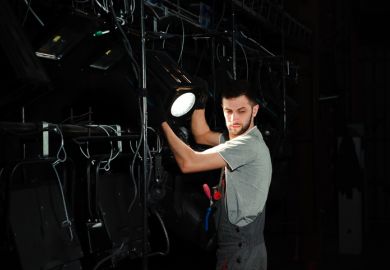Edith (Edy) Craig (1869-1947) was an inspirational and important Modernist theatre-maker, but it is only in the past 30 years that her significance as a director, costumier, pageant-maker, feminist, lesbian and suffrage activist has been appreciated. Her “laughing self-effacement” was probably one reason she came close to being written out of mainstream theatre history, except as a footnote to the career of her celebrated mother, Ellen Terry, one of the leading performers of her age.
Craig also had to compete with her brother, the self-publicising director and theatre theorist Edward Gordon Craig. The siblings disagreed about almost everything – women’s enfranchisement, how to direct, the importance of the actor – but especially about their mother, and how Terry’s career should be memorialised. George Bernard Shaw summed up the siblings’ antithetical approaches to theatre in the comment, “Gordon Craig has made himself the most famous producer in Europe by dint of never producing anything, while Edith Craig remains the most obscure by dint of producing everything.” But he wrote about theatre, while she did not, and in the history books he stole much of the limelight.
Katharine Cockin has already done a great deal towards addressing this imbalance; she has published a biography of Edy Craig, edited six volumes of Terry’s letters and established a database of the Terry/Craig archives. She positions Edith Craig and the Theatres of Art as a “sequel” to her earlier biography, but it is not a sequel in the conventional sense. The book is full of fascinating nuggets of information and ranges across amateur, community and professional theatre, nativity plays, lesbian networks, suffrage pageants and the Little Theatre movement. But overall it reads as a collection of leftovers from the earlier work. There is a cabinet-of-curiosities feel that is exacerbated by the irritating repetition of information, sometimes word for word and only a few pages apart.
While I welcome Cockin’s insistence that Craig’s achievements deserve still more acknowledgement, this books skirts the really big question of why Craig, like her brother, remained financially dependent on Terry for so long. Terry’s daughter didn’t produce a gaggle of dependants – including children and discarded partners – as her brother did, but she lived in a lesbian ménage à trois with writer Christopher St John (Christabel Marshall) and artist Tony (Clare) Atwood in a house owned by, and then inherited from, Terry, with the household income supplemented by publications about Terry and her views on theatre, Shakespeare and his heroines. Certainly one reason that both children could take commercial risks and experiment artistically was because Terry was subsidising them even in old age, tottering onstage half-blind to raise funds. Edith Craig and the Theatres of Art presents a collage of Craig’s achievements, celebrating her maverick career, but it does not ask tough enough questions about the financial privilege underpinning Craig’s theatre practice.
Liz Schafer is professor of drama and theatre studies, Royal Holloway, University of London, and a University and College Union caseworker.
Edith Craig and the Theatres of Art
By Katharine Cockin
Bloomsbury
328pp, £85.00, £27.99 and £21.99
ISBN 9781472570628, 0611 and 0642 (e-book)
Published 26 January 2017
Register to continue
Why register?
- Registration is free and only takes a moment
- Once registered, you can read 3 articles a month
- Sign up for our newsletter
Subscribe
Or subscribe for unlimited access to:
- Unlimited access to news, views, insights & reviews
- Digital editions
- Digital access to THE’s university and college rankings analysis
Already registered or a current subscriber?




